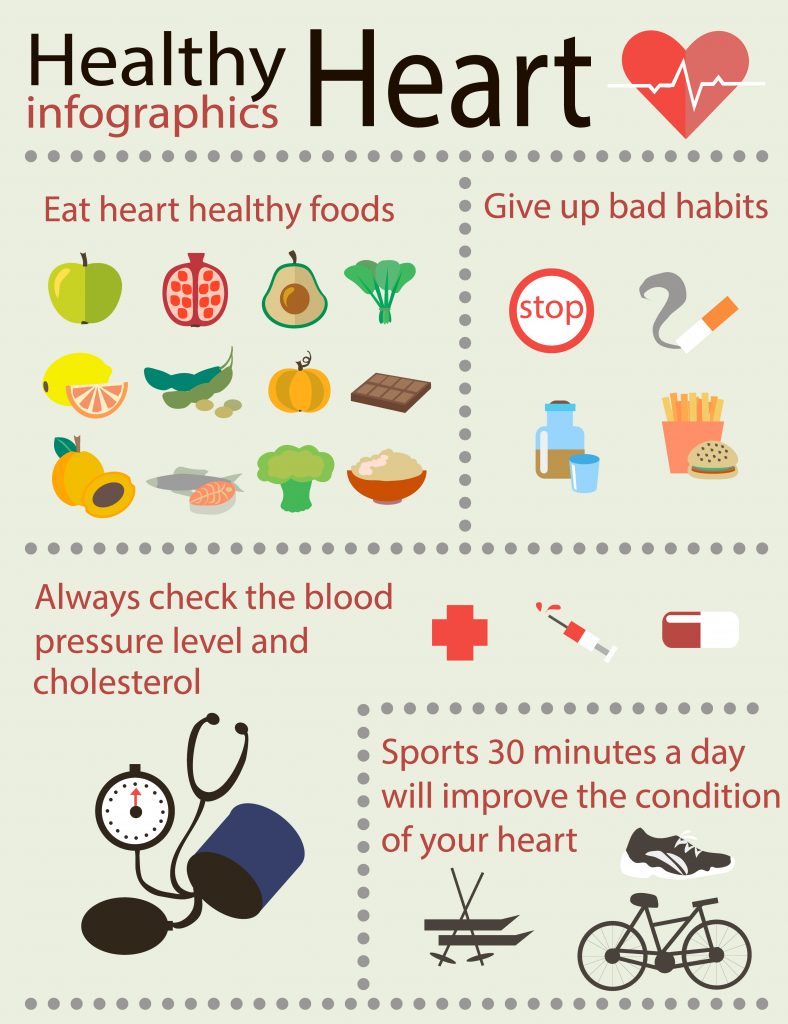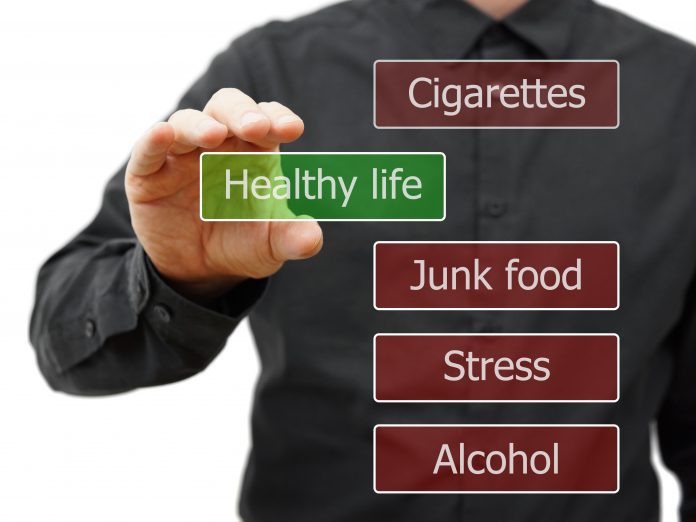The heart is one of the most important organs in the human body, beating continuously, and pumping blood around the body. We should be taking care that it’s maintained at its healthiest. Yet, knowingly or unknowingly, we indulge in habits that could cause harm.
Stress
Stress is a part of our lives, but some of us get affected more than others. Stress causes inflammation in the body, which can result in complications such as hypertension and low HDL levels .Besides, a stressed out body releases cortisol, a hormone causing hypertension, hyperlipidemia and diabetes.
Stress also has a toll on the lifestyle – people become withdrawn, stop eating or binge eat, stop exercises. All of these can contribute to heart disease.
Poor diet
Diet is an important part of keeping the heart healthy. A poor diet- high in saturated fats and Trans fats- reduces HDL levels. Trans fats, those found I processed foods, cannot get digested by the body.
Alcohol
A little alcohol may be good for you; large quantities can be harmful. Excessive alcohol can give rise to hyper lipedema and hypertension. It can also cause obesity, which puts your heart at risk
Inadequate sleep
Sleep impacts the functioning of the heart. Research has linked inadequate sleep with hypertension. Our blood pressure tends to reduce when we sleep; also, our muscles and body tissues repair themselves. Insomnia tends to cause hypertension, making the heart pump harder.
Too much salt
Salt, though an important and integral part of our diet should be consumed with caution. An increased salt intake causes hypertension, with a risk of strokes, or a myocardial infarct.
Avoiding check ups
With our busy schedules and hectic lifestyles, it’s easy to postpone regular blood checks and consultations, which could otherwise tell us our health status, our blood pressure, sugar levels etc.
Couch potato
Sitting in a place for long periods of time – a movie marathon, work or long travels- can alter your blood levels of fats and sugars, putting you at risk of a cardiac eventuality.
Depression
Depression makes you ignore your health- people tend to lose interest in exercising, indulge in comfort food- usually sugary and processed food, with a lot of salt. All of these have a negative effect on the heart.
Snoring
We tend to ignore snoring, accepting it as annoying but harmless. The fact is, snores could indicate a deeper problem, known as obstructive sleep apnea. OSA has been associated with various heart conditions, such as hypertension and arrhythmias. Research shows that OSA increases the risk of heart failure by 140%.
Too much exercise
Excessive exercise or extreme exercise training can cause a strain on the heart, leaving you vulnerable to cardiac arrests. They may lead to thickening of the heart walls and scarring, and ultimately, to sudden cardiac arrests.
Overeating
Thinking your fine
Just being asymptomatic does not make one healthy. As you know, diseases like diabetes are silent killers. Being a diabetic, overweight, hypertensive, will all push you towards an inevitable cardiac eventuality.
Smoking
We are all aware that smoking is bad for health, but to get rid of the addiction can be tough. What most people don’t know, is that the chemicals in tobacco smoke can cause the blood to clot, exposing them to strokes, aneurysms or myocardial infarcts
Research has shown that passive smoking can be as dangerous, with innocent people becoming victims.
Skipping meds
Taking medication daily can often seem like a chore, especially if you’re asymptomatic. At times, people avoid them because of the side effects or because of the increased expenses.
Red meat
Red meat is a popular food of choice, and a popular fast food ingredient. If consumed very often, though, it has a tendency to clog the arteries and block blood vessels.
While it was earlier believed that this was the effect of the high fat content, it is now believed that the effect is due to the production of a chemical called TMAO, when gut bacteria break down certain nutrients in the red meat.
Eating empty calories
Foods rich in sugars and fat, with little or no nutritional benefits, come in this category. Cakes, chocolates, certain meats, soft drinks, energy drinks, alcohol, are all just a source of additional, empty calories. They put you at risk of diabetes and hypertension, and leave you vulnerable to heart diseases.
Research has found that, while men consume an average of 900 empty calories a day, women have over 600.
Ignoring the symptoms
Sudden breathlessness while climbing the stairs, a tightening or pain in the chest , excessive perspiration, or any difficulty performing an activity which you can generally perform easily, should raise an alarm. Very often, we either ignore them or try to pass them off as just being out of shape.
Avoiding fruits and veggies
Our busy schedules and hectic lifestyles make us turn to quick fixes – packaged food, fast food on the go. We tend to miss out on the fruits and vegetables that are essential for us to function in a healthy manner.
No flossing
Studies have shown a tangible relation between gum infection and heart disease. Not flossing your teeth causes plaque formation around the gums and teeth, leading to inflammation. This, in turn, aggravates atherosclerosis and heart disease.
Overweight
Obesity is directly responsible for a number of chronic medical conditions, including hypertension and diabetes and heart disease.
Belly fat
Research has shown that people having an apple shaped body (fat around the abdomen) are more susceptible to cardiac problems than people with pear shaped body (fat around the hips).


Correcting measures
Set goals
Don’t pressurize yourself into overachieving. Set a milestone, reach it, and then aim for more. Reduce your blood pressure gradually, Try getting adequate sleep, and try to switch to a healthy diet, if you’re not.
Get used to one change, before you introduce another one in your routine.
Get food conscious
Always be aware of what you’re eating. Indulge in green, leafy vegetables and fruit- they act as antioxidants as well as powerhouses of multivitamins. Have food rich in omega 3 fatty acids, they’re very good for the heart. Try to include 4 to 5 fruits and vegetables in your daily diet routine.
Avoid processed and sugary food, too much packaged food and excessive salt. Breads, cakes, chips, for example, should be had with caution.
Exercise
Just an hour of vigorous exercise a day isn’t quite enough. You need to keep moving throughout the day. Take a walk between calls; stretch your legs during a movie.
If you don’t exercise at all, start with 30 minutes, 5 times a week.
Reward yourself
Celebrate the milestones, reward yourself for every kilo you lose, for the blood pressure that gets controlled. The reward often motivates you to take the next step.
Get support
Do not hesitate to get support if you cannot get things under control. Talking to a physician can help guide you to the right decision, for your health.
Being stressed and depressed can take a toll on your heart; try to consult a counselor who can help you treat your problems.
Stay on track
Falling off the rails is fairly easy, but try to stay on track as far as your health is concerned- take your medication on time, keep aside time for exercise, resist the fast food.
Regular investigations
Do not run away from tests that tell you the status of your health. They help guide you and the physician, towards the best treatment to keep you healthy.
Floss everyday
It seems like a mundane point, but flossing everyday prevents plaque formation and infections in the gums, and helps keep the heart safe.
Control the salt
The recommended salt intake is about 1500 mg per day. That’s just about 1 tsp of salt spread across all your meals. Try to avoid any more.
Reduce the alcohol
Drinking a couple of glasses, once in a while, is fine. However, try to avoid indulging in alcohol daily.
Stop the smoking
Smoking, even passive smoking, can be very dangerous for the heart and lungs. It should be stopped completely.
A few lifestyle changes can make a large difference to your heart’s health. Take the first step, it’s the most difficult.




